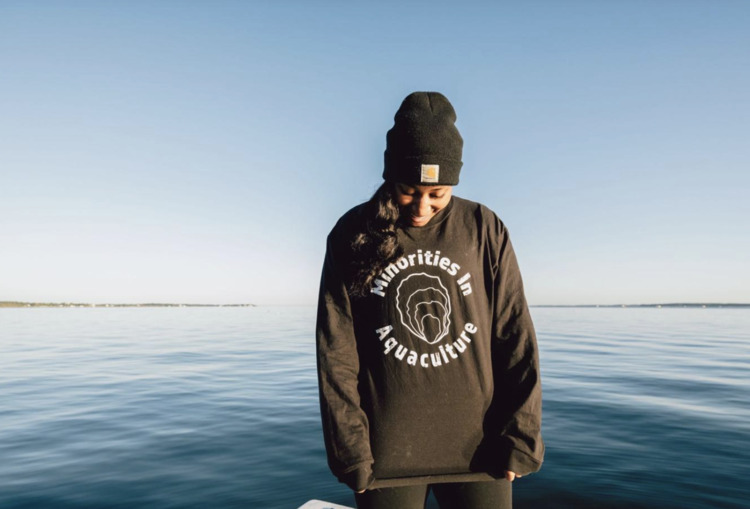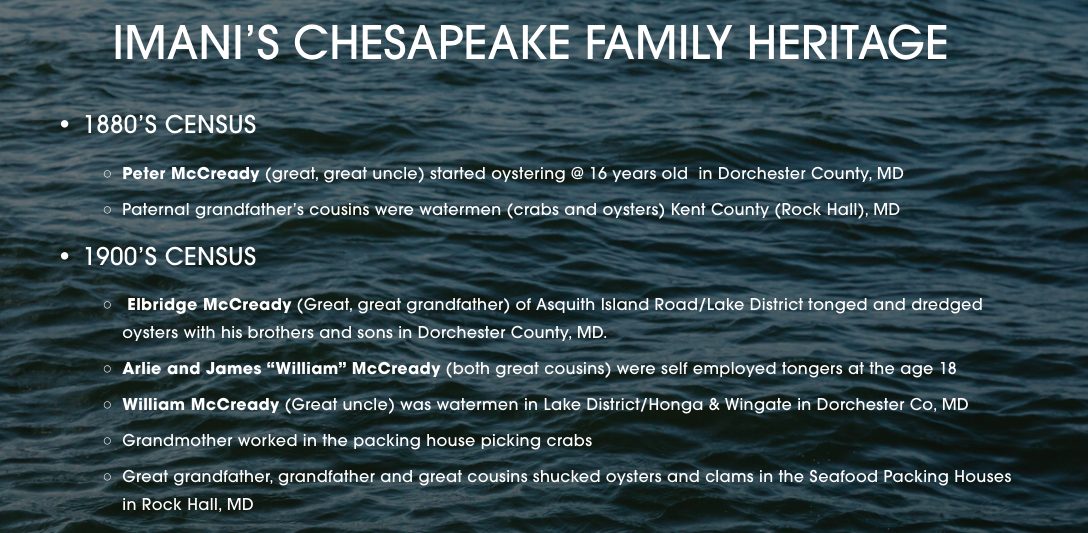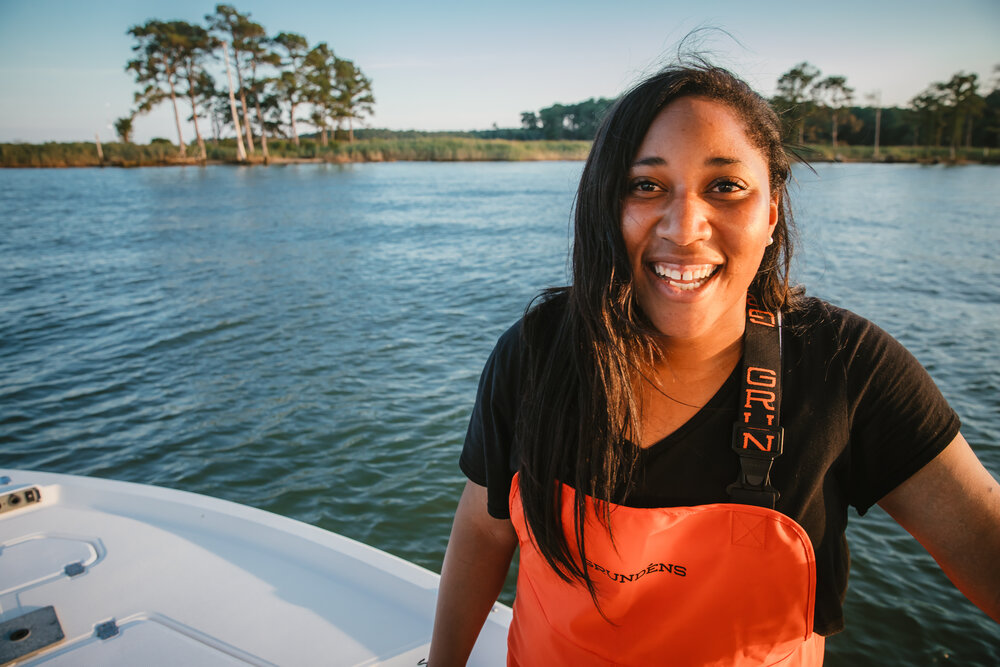5-Minutes with Imani Black of Minorities in Aquaculture
When I read the name, Minorities in Aquaculture, it made me think. Minorities had fished our country before we were a country, pioneering the big industry we know today. In the book, Diary of a Sea Captain’s Wife, written at the turn of the last century, Eaton speaks of Russian, Japanese, and Portuguese lobstermen in California’s Channel Islands. Pre-Civil War, highly-skilled enslaved watermen supplied seafood to cities along the East Coast and the deep South. But now, if you look around the aquaculture and commercial fishing industry, you’ll generally see Caucasian faces. (At least in my experience of being a POCF in commercial fishing towns like Bellingham, Washington, and Santa Barbara, California. A conversation about minorities in commercial fishing to follow.) What’s it like where you live?
But what is aquaculture? According to MIA, aquaculture is “the production of aquatic organisms in a controlled environment through breeding, rearing & harvesting” in fresh or saltwater. Think of how agriculture pertains to farming, but with aquatic organisms like mollusks, crustaceans, algae, and fish. (The opposite of commercial fishing, which harvests wild-caught.)
I’m so excited about this interview with founder Imani Black. Talking on the phone with her was so interesting and easy, just a good time. We talked about her grandmother’s recipe for oyster fritters, how MIA is gearing toward a national movement, and questions about race in the industry that some feel too awkward to ask. Let’s dive in!

5-Minutes with Imani Black of Minorities in Aquaculture
Let’s start with the basics. Which do you prefer – Black or African-American?
I don’t really have a preference, but probably African American.
Cool. You mentioned that you didn’t realize that your family had such deep roots in fishing and aquaculture until you got a little older and showed interest in marine biology?
Yeah, it wasn’t until I was in high school that my mom really got into our genealogy. That’s when she knew that I was bringing it back full circle.
That’s amazing that the water feels so inherent! How far back was she able to track?
The 1800s. That’s from the information that I’ve picked through. My mom has continued to do research here and there, but as far as I know, the 1800s. They were just full-fledged watermen who work on the water full-time.

If we could talk about enslaved watermen on the East Coast and the South, what are your thoughts, and how does this relate to MIA.?
I think it’s important to keep that history at the forefront because many people don’t know it. Especially for people of color, it’s more of a representation thing. I use Minorities in Aquaculture for educational purposes. I also use it to show young minority women that we’ve been a part of this for a while and are not being introduced to something new. It’s like giving a history of where our families came from.
To clarify on my end, Minorities in Aquaculture is targeted at women and minorities or minority women?
It’s mostly women of color at this point. And I’ve gotten a little feedback that I need to be “more inclusive,” but this is my reasoning: I’m an African-American woman and haven’t seen another African-American woman in aquaculture. Actually, I’ve only seen one when I was in Hudson, New York. She was the first African-American woman in aquaculture that I’d ever seen. When you look at a lot of the history, specifically African-Americans in the Chesapeake Bay, it’s mostly men. Women of color have had a huge footprint in the evolution of our seafood and packing houses and shucking houses and being really supportive wives to their Waterman husbands and things like that.
Women are just so powerful, intelligent, creative, and skilled in so many different ways that I wanted to target specifically the people – women – that aren’t in the history books. With MIA, even though it is only targeted to women of color, I want to use partnerships, mentorships, and internships to highlight as many women in aquaculture as possible, regardless of their race or background.

When did you start MIA, and what has the community’s response been since you began?
The community has been another overwhelming aspect of it. I didn’t start Minorities in Aquaculture to be this huge thing. I started it when I was unemployed; I just lost my job in May of 2020, and I was devastated because I felt like it was my dream job. So, I just did it because I saw a need and just wanted to try. And the support I’ve gotten within the community and other environmental organizations have had for it makes me more aspirational.
For example, I’m starting my graduate program at the University of Maryland’s Center for Environmental Science at Horn Point Laboratory in Cambridge, MD. Since January 2020, I’ve been a Faculty Research Assistant and now transitioning over to a full-time student. My professors have said, Don’t stop because you’re in grad school. We want to support you. So, they are helping me get through the first couple of years of being a non-profit. It’s like a pinch-me moment at times because I never expected any of this.
Like Admiral Vince Leggett & Captain Lamont Wright, some of my idols on the Chesapeake Bay. They are two really historical African-American men who are very vocal about their support, and I never dreamed that anybody like that would even know my name. To have a conversation with them and to hear they’re proud of what I’m doing and think that MIA will change a lot of lives, that’s all that I need to hear. It keeps me pushing forward.
What do you know of the partners of watermen in your family?
Though my family has a huge legacy of being on the water, it skipped a few generations before it came back to me. So I haven’t had a POCF or another waterman in my lifetime. But my grandmother worked at the packing houses and the shucking houses, and I’ve gotten the verbal history of it, like my grandmother’s stories about the ladies singing church hymns while they were shucking oysters and picking crabs. And she can still pick craps faster than anybody in my family!
What’s a memory of eating seafood as a child?
It’s so funny because when I had my first crab, I was hooked. My mom, aunt, and grandmother were picking crabs, and I pulled on my mom’s pant leg, saying that I wanted more. We’re not like a huge family, but my grandmother is kind of the glue and the backbone of many of our recipes, like oyster fritters. Eating seafood is a time to really connect with her. We sit around and talk and pick crab and catch up with each other.
What’s your favorite way to eat seafood?
My favorite way of eating seafood is catching it myself, you know? But my favorite way is steamed crab with spices and oysters on the half shell. Also, my grandma makes oyster fritters.
Sounds amazing, but what exactly is it? Would you please describe the difference between a fried oyster and an oyster fritter?
A fritter is like a pancake. The oysters are chopped into little pieces, then put into the batter, and cooked like pancakes instead of being battered and fried. Cook the batter until the outside’s really crispy and the inside is really soft.
Yum! Do you eat it plain or with a sauce?
You can eat it plain or with tartar sauce. I like it plain. Honestly, my grandma knows just how to season it, so I like it plain. But I’m sure you can put whatever you want on it.
A recipe that’s probably nowhere close to Imani’s grandmother’s is here. (But we can try! 😄)
What do you hope someone will take away from MIA?
I want to create a network to show women of color that is something you can do. You can take success into your own hands, step into that path, and it’s not only going to be great for you but also the community and aquaculture. 🐟
What’s your biggest takeaway from Imani? How do minorities play a role in your fishery or aquafarm? Would love to hear your thoughts in the comments below!
Need advice about being with a commercial fisherman? Read Here! Letter: I’ve Heard Almost Nothing from Him.”

